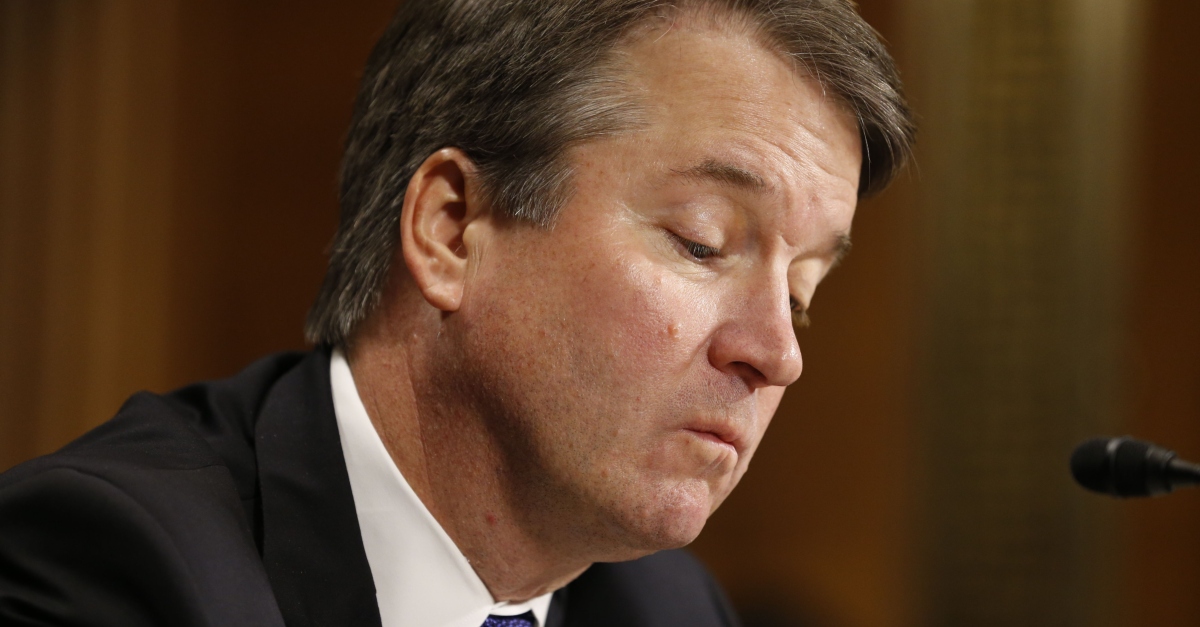
Two ethics complaints have been filed against Brett Kavanaugh in the U.S. Court of Appeals for the D.C. Circuit Court on which he sits. As of this writing, those two complaints are being administered by the circuit court’s chief judge and previously defeated Supreme Court nominee Merrick Garland.
Kavanaugh is likely to face ethical questions despite the disposition of those two official complaints due to his partisan attacks against Democrats, “the Clintons” and other liberal groups when he alleged a vast, left-wing conspiracy against him during testimony in front of the Senate Judiciary Committee last week.
According to Buzzfeed News’ Zoe Tillman, one of those official complaints concerns an allegation that Kavanaugh “lied about the sexual assault allegations against him.”
Filed on September 27, the sexual assault complaint predates Kavanaugh’s recent testimony during his re-hearing to address the allegations leveled against him by Dr. Christine Blasey Ford. This complaint does, however, contain specific allegations of perjury against Kavanaugh due to his written statements provided while to the Senate while under oath. The 12-page filing notes, in relevant part:
In written testimony submitted to the Senate Judiciary Committee on September 26, 2018, while Kavanaugh remained under oath he, state: “the truth is that I have never sexually assaulted anyone–not in high school, not in college, not ever.”…In his written testimony, he characterized the reports of sexual abuse made by Ramirez and Switnick [sic] as “smears, pure and simple.” He went on to claim that their reports of sexual abuse were “grotesque and obvious character assassination.” Kavanaugh demonstrated his lack of fitness to be a judge by falsely attacking the witnesses against him in this manner.
The other complaint deals with allegations that Kavanaugh lied before the Senate Judiciary Committee when he testified during his initial confirmation hearing that he didn’t know he received and worked off of a treasure trove of documents stolen by a GOP operative from Senate Democrats during his time with the administration of George W. Bush.
The 11-page filing notes, in relevant part:
In 2002, Manuel Miranda, a Republican staff member on the Senate Judiciary Committee, stole thousands of documents belonging to committee Democrats…In testimony before the Senate Judiciary Committee on September 5, 2018 and September 6, 2018 related to his confirmation to the Supreme Court of the United States, Kavanaugh falsely testified under oath that he had no knowledge that Miranda had infiltrated Democratic files, concealed the fact that he knowingly received and read information about the stolen documents and concealed his prior false testimony to the Senate in 2004 and 2006. The July 28, 2002 email from Miranda to Kavanaugh and other emails recently released to the public establish that Kavanaugh gave false testimony before the Senate Judiciary Committee…
Both the sexual assault-themed complaint and the stolen documents-themed complaint base their objections to Kavanaugh on the Judicial Conduct and Disability Act (JCDA) and the Judicial Conference of the United States’ Rules for Judicial-Conduct and Judicial-Disability, essentially various standards of professional behavior codified in federal law and by which all U.S. judges are expected to abide or face censure, impeachment and/or removal from the bench.
The Judicial Conference is a little-known but hugely influential body which is responsible for making national policy for and overseeing all U.S. federal courts. The conference derives its authority from 28 U.S.C. § 331. Under the JCDA, any U.S. citizen may file a complaint against a federal judge over perceived ethics violations. Proceedings under the JCDA are governed by the conduct and disability rules and ultimately overseen by the Judicial Conference.
The two extant ethics complaints against Kavanaugh were filed by the Democratic Coalition, a Super PAC led by Democratic Party fixture Scott Dworkin and previously profiled by Law&Crime here.
Law&Crime reached out to the D.C. Circuit Court’s Deputy Circuit Executive Steven Gallagher for additional information on those complaints, but no response was forthcoming at the time of publication.
[image via MICHAEL REYNOLDS and AFP and Getty Images]